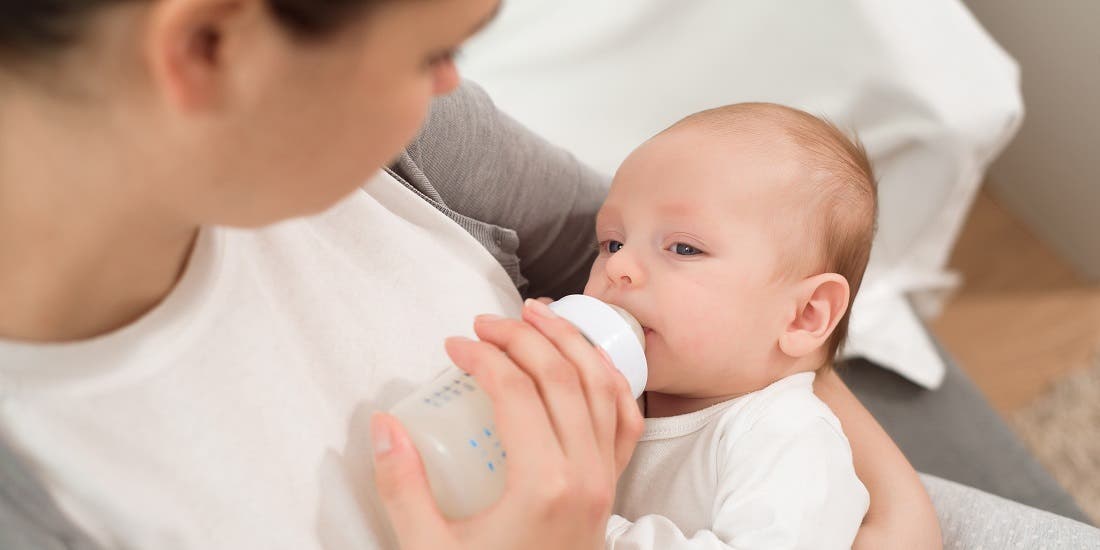Baby formula benefits: Separating fact from fiction in nutrition and health claims
Researchers examined the claims made by infant formula manufacturers regarding brain development, immune system support, and other benefits.

[May. 3, 2023: JJ Shavit, The Brighter Side of News]
Are infant formula promises just hot air? (CREDIT: Creative Commons)
Are infant formula promises just hot air? New research led by Imperial College London has cast doubt on the nutritional and health benefits claimed by many breast milk substitutes.
The study, which was recently published in the British Medical Journal, found that the vast majority of claims made about these products are based on little or no scientific evidence. The authors of the study are calling for stricter regulations to be put in place to protect consumers, particularly infants, from potentially harmful marketing tactics.
The researchers looked at products from 15 different countries, including Norway, Australia, Canada, Germany, India, Italy, Japan, Nigeria, Pakistan, Russia, Saudi Arabia, South Africa, Spain, Great Britain, and the USA. They examined the claims made by infant formula manufacturers regarding brain development, immune system support, and other benefits, and compared them to the scientific evidence available.
The study found that only a small proportion of products referred to scientific research to support their claims, and the majority of the research was industry-funded and therefore likely biased.
Related News
Norwegian mothers are among the most likely to breastfeed their infants, with four out of five six-month-olds still receiving breast milk.
This is in part due to supportive social arrangements and long parental leave. Melanie Rae Simpson, an associate professor at NTNU’s Department of Public Health and Nursing, says that strict rules around marketing breast milk substitutes mean that advertising does not influence how long women in Norway breastfeed. However, a relatively high proportion of the products available in Norway include claims about being beneficial for health, according to Simpson.
Despite the high rate of breastfeeding in Norway, a wide range of infant formula products are still sold in pharmacies. These products are typically marketed for children with special needs and often make claims about their nutritional and health benefits.
While Norwegian legislation is in place to prevent undocumented claims from being used in connection with breast milk substitutes, the documentation was found to have the same challenges around transparency, independence from industry, and scientific quality as in other countries.
The study tested a total of 757 products, with 608 of them making at least one of 31 different claims about nutrition and health. The researchers found that 41 different ingredients were linked to these claims, although several companies also market their products without referring to specific ingredients.
Outline of main number of products, claims, ingredients, and references cited. (CREDIT: BMJ)
Of the 608 products making claims, only 161 referred to scientific research to support their claims, and of those, only 14% were clinical investigations carried out on humans. The researchers found that 90% of the human clinical trials had a high risk of biased research, either because they had received money from the industry or because the research was carried out by the industry itself.
The study found that the average number of claims made by infant formula products was two, with the USA having the highest average of four claims per product. The researchers argue that this level of aggressive marketing needs to be addressed to avoid unwanted consequences for children’s health.
Network plot of claims associated with ingredients with a frequency of ≥10. Green midpoint box represents health claims associated with a non-specified ingredient. Blue labels represent type of ingredient; different shades represent unique ingredients associated with different claims. Purple labels represent health and nutrition claims. Thickness of lines represents frequency of health claims associated with an ingredient. CMA=cow’s milk allergy; MFGM=milk fat globule membrane. (CREDIT: BMJ)
Professor Nigel Rollins from the World Health Organization (WHO) supports the researchers’ call for stricter regulations, stating that self-regulation, where the industry itself largely runs the research on product effectiveness, is not good enough.
The authors of the study argue that the current situation around infant formula marketing is potentially harmful to both children’s health and parents’ wallets. They believe that regulatory authorities in various countries should consider implementing stricter rules to better protect consumers from potentially harmful marketing tactics.
In conclusion, the study raises serious concerns about the claims made by infant formula manufacturers and highlights the need for increased transparency and independent research to ensure that infants receive the best possible nutrition.
Reference: Cheung K Y, Petrou L, Helfer B, Porubayeva E, Dolgikh E, Ali S et al. Health and nutrition claims for infant formula: international cross sectional survey, BMJ 2023; 380 doi:10.1136/bmj-2022-071075
Note: Materials provided above by The Brighter Side of News. Content may be edited for style and length.
Like these kind of feel good stories? Get the Brighter Side of News' newsletter.



